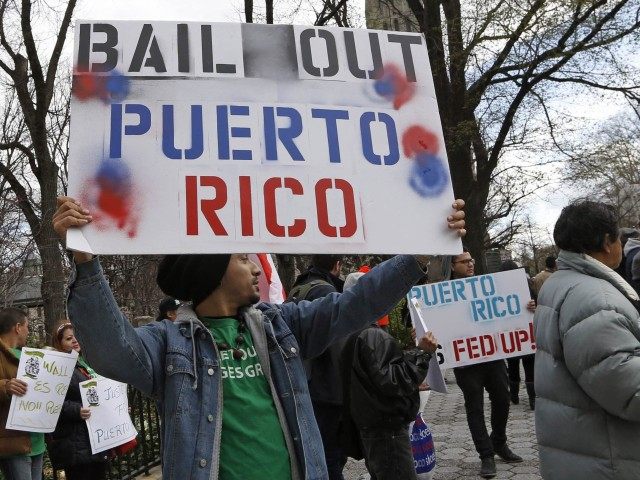Although House Speaker Paul Ryan (R-WI) warned that Congress needs to “bring order to the chaos” in Puerto Rico, conservative House Republicans are giving the cold shoulder to a plan that would let Puerto Rico wipe out $33 billion of its $73 billion debt in bankruptcy.
Leadership of both political parties are backing the creation of a federal “control board” and legal authorization for Puerto Rico to file bankruptcy. The effort would pave the way for a “cramdown” of about 45 percent of the island’s debt, without any spending cuts.
But conservative Republicans on April 14 revolted to favor the rights of bondholders over politicians by killing what was expected to be a rubber-stamped Natural Resources Committee vote to bring the “Puerto Rico Oversight, Management, and Economic Stability Act” to the House floor for passage.
Because the interest on municipal bonds is federally tax-exempt, individuals tend to be the largest holders of municipal bond debt in the United States. That is why millions of non-Puerto Ricans own about half of the island’s debt as individuals or through small investor holdings in 377 bond mutual funds, according to data from Morningstar.
A few local individuals own the island’s bonds, but most of the one-third held by “ordinary Puerto Ricans” are through crony investments by the island’s ruling Popular Democratic Party (PDP)-controlled credit unions.
Due to Puerto Rico’s continuing financial woes and recent bond defaults, about $15 billion, or 20 percent, of the island’s $73 billion in municipal bond debt has been bought up by “hedge funds” at about 50 cents-on-the-dollar. Unlike conservative investors, who try to lock in long-term retirement income, hedge funds are willing to make high-risk speculative investments in search of high-short-term-gains.
There are 3 generally equal-sized “tranches” of Puerto Rico municipal bonds. General Obligation and guaranteed bonds are supposed to be paid priority interest by the government; then “Confina” sales-tax bonds, and, last, an assortment of other bonds.
Before Puerto Rico asked Congress to give it the right to file for bankruptcy, it tried to convince bondholders that it was in their “best interest” to exchange all their bonds into between 73 cents on-the-dollar and 39 cents-on-the-dollar in so-called “Base Bonds,” depending on priority. The new bonds would supposedly receive asset liens on facilities and priority interest payments from tax streams.
But few bondholders seemed interested in taking such massive haircuts on their debt. As Breitbart News outlined in October, after the proposed debt exchange, Puerto Rico intended to issue more bonds, rather than cutting spending.
Despite Puerto Rico’s constitution requiring a balanced budget, the ruling PDP has been borrowing money to fund deficits for years, based on the accounting trick of treating proceeds from bond sales as a form of revenue.
The key reason’s Puerto Rico’s economy has imploded is that the PDP-controlled legislature made Spanish the official language for all schools and government use in 1991. As a result, 86 percent of the island does not speak English in the home. Poor language skills are the major impediment to relocating call-centers and other U.S. service businesses to Puerto Rico.
Puerto Rico employment compares unfavorably to the 52 percent of Greeks currently working: while 23 percent of the Greek population is on “the dole,” over 27 percent of the people of Puerto Rico USA are on welfare.
Greek politicians are blamed for trying to buy votes by spending 29 percent of the nation’s gross domestic product (GDP) on government “transfer payments” for disability, housing, family, old age, unemployment, and health benefits. But similar transfer payments in Puerto Rico amount to over 40 percent of the island’s GDP.
Governor Alejandro García Padilla, who has difficulty speaking English, told Bloomberg last year that Puerto Rico had a constitutional and moral obligation not to default on the island’s debt. But he then led his PDP majority to pass a law giving local courts the power to cancel much, if not all, of the island’s municipal bond debt.
Breitbart News reported on August 4 that Puerto Rico officially defaulted on a $58 million debt payment by only paying $628,000. Governor Padilla complained that the island was in a “death spiral,” because the economy has been shrinking at 6% annually and only 1.2 million, or 32 percent, of the island’s 3.7 million inhabitants are employed.
To put pressure on Congress, the PDP passed a bill on April 5 to give Padilla the right to declare a state of emergency, and then halt payments on all $73 billion of debt. But it seems that a group of conservative Republican, not as easily intimidated as their leadership, has decided to call the PDP’s bluff.

COMMENTS
Please let us know if you're having issues with commenting.